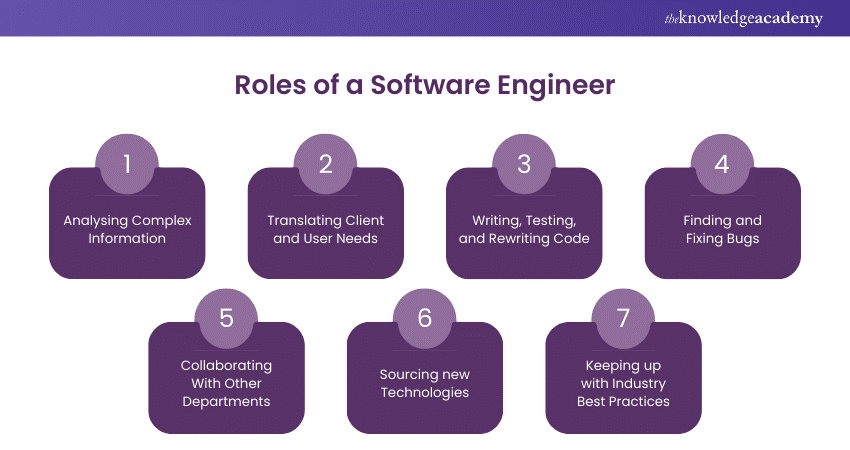We may not have the course you’re looking for. If you enquire or give us a call on + 1-866 272 8822 and speak to our training experts, we may still be able to help with your training requirements.
Training Outcomes Within Your Budget!
We ensure quality, budget-alignment, and timely delivery by our expert instructors.

Staying informed about Software Engineer Salary trends is more important than ever, especially in the ever-evolving tech landscape. In addition, the software market in the United Kingdom is projected to grow by 6.42% from 2024-2028. Given this context, are you eager to discover how your skills and experience can elevate your earning potential? This blog uncovers the latest insights and trends, offering a detailed look at what you can expect in terms of compensation.
It will also uncover the various factors that influence the Software Engineer Salary. Be it the income potential across different regions and industries or the technical skills that can significantly boost your income, it will include everything in detail. Dive in to navigate your career path with confidence.
Table of Contents
1) What is a Software Engineer?
2) What Does a Software Engineer do?
3) Software Engineer Salary by Job Title
4) Software Engineer Salary by Location
5) Software Engineer Salary by Experience
6) Factors Affecting the Salary of Software Engineers
7) Conclusion
What is a Software Engineer?
In the Software Engineering profession, you will engage with various industries to plan, design, and manage large-scale enterprise computer systems and software tailored to your company’s requirements. You will often create prototypes and assess the feasibility of your proposed solutions. Following this, you will supervise the implementation of these software systems, ensuring they are tested for bugs and optimised for user experience. You may collaborate with team members such as:
a) Software Developers
b) Analysts
c) Designers
d) Data Scientists
e) Project Managers
What Does a Software Engineer do?
As a Software Engineer, you might have the opportunity to develop software, websites, and various applications. This broad discipline opens up numerous career paths. Below are some fundamental skills and responsibilities that define the role of a Software Engineer:

a) Understand functionalities and limitations to identify issues, optimise performance, and develop new features.
b) Translate client needs and user feedback into actionable development plans.
c) Write, test, and refine code to enhance functionality, efficiency, and security, including debugging and refactoring.
d) Identify and fix software bugs using various debugging tools and techniques.
e) Work with programmers, Technical Writers, and other stakeholders to guide development, documentation, and deployment.
f) Evaluate and implement new technologies to improve products and drive innovation.
g) Keep updated on industry best practices, trends, and technological advancements.
Boost your expertise with our Systems Engineering Training - sign up now and become a leader in the industry.
Software Engineer Salary by Job Title
Software Engineering is a wide field with numerous lucrative career opportunities. Here are some common job titles in Software Engineering and their associated responsibilities:
1) Front-end Developer
Front-end Developers concentrate on creating the visual and interactive aspects of websites or applications that users interact with. They use programming languages like HTML, CSS, and JavaScript. Their responsibilities include fixing code errors, debugging applications, and understanding user design and experience principles.
2) Web Developer
Similar to Front-end Developers, Web Developers specialise in building and maintaining websites. They may create websites from scratch or manage existing ones, improving loading speeds, technical SEO, and other performance indicators.
3) Cyber Security Engineer
Cyber Security Engineers are responsible for protecting a company’s networks, systems, and data. They identify potential security threats and develop solutions to mitigate them. Tasks include installing firewalls, testing systems for vulnerabilities, and analysing risks.
4) Data Engineer
Data Engineers blend data analytics with Software Engineering. They design and create data systems to help companies collect, store, and understand large volumes of raw data. They also ensure data accessibility for team members like Data Scientists and Business Analysts.
5) Full-Stack Developer
Full-Stack Developers collaborate for both front-end and back-end development. They are versatile professionals with experience in both areas, making them highly sought after. Their broad skill set lets them to handle various aspects of Software Development.
6) Back-end Developer
Back-end Developers focus on the server-side elements that power applications but are not visible to users. They use programming languages like Python, PHP, and Ruby. They collaborate closely with Front-end and Web Developers to integrate server-side and front-end functionalities.
Understanding how compensation varies by job title can help you identify potential career paths and set realistic salary expectations.
Below is a detailed breakdown of Software Engineering salaries by job title:
|
Job Title |
Average Annual Salary |
|
Front-End Developer |
£45,000 |
|
Web Developer |
£32,500 |
|
Cyber Security Engineer |
£48,540 |
|
Data Engineer |
£51,973 |
|
Full-Stack Developer |
£47942 |
|
Back-End Developer |
£71,100 |
Source: Glassdoor
Optimise your workflow with our Software Development Lifecycle Training - register now and boost your professional growth!
Software Engineer Salary by Location
Geographical location significantly impacts the salary of Software Engineers. Below is a detailed breakdown of Software Engineer Salaries by location:
|
Country |
Average Annual Salary |
|
UK |
£66,172 |
|
USA |
$102,000 |
|
India |
₹800,000 |
|
Canada |
$95,000 |
|
Singapore |
$78,468 |
|
Australia |
A$95,000 |
|
UAE |
AED 300,000 |
Source: Glassdoor
Software Engineer Salary by Experience
Experience level is a key determinant of salary for Software Engineers. Below is a detailed breakdown of Software Engineer salaries by experience level:
|
Experience Level |
Average Annual Salary |
|
Entry-level (0-2 Years) |
£36,296 |
|
Mid-level (2-5 Years) |
£52,500 |
|
Senior level (5+ Years) |
£65,000 |
Source: Glassdoor
Factors that Impact Software Engineer Salary
Depending on your education, experience, location, and industry, your expected salary will vary. Let’s discuss these factors in detail:
1) Educational Background and Certifications
Employers mostly prefer candidates with at least a bachelor’s degree in fields including Computer Science, Electrical Engineering, or Computer Engineering. However, it is possible to acquire the necessary qualifications for a Software Engineering role without a formal degree. Here are some common majors for Software Engineers:
a) Computer Science
b) Electrical Engineering
c) Computer Engineering
d) Information Technology
e) Other related majors
2) Technical Skills
Technical skills are crucial for success as a Software Engineering and can significantly impact your earning potential. Developing these skills can help you secure higher-paying jobs. Here are some key skills and their potential impact on your salary:
a) Scala: An object-oriented programming language for building scalable and fast software.
b)OS Kernels: The core part of an operating system that manages interfacing, scheduling, and memory operations.
c) Big Data: Refers to complex data sets that require more powerful processing than traditional methods.
d) Machine Learning: A sub-category of Artificial Intelligence (AI) that focuses on algorithms enabling machines to learn similarly to humans.
3) Work Experience
Work experience significantly impacts salary and varies across different career stages. Let’s explore them:
a) Entry-level Positions: Salaries can vary widely depending on the company and location. These positions generally offer lower salaries but provide valuable experience and growth opportunities.
b) Mid-level Positions: As you gain experience, your salary typically increases. Mid-level Software Engineers typically possess several years of experience and a history of successful projects, which results in higher compensation.
c) Senior-level Positions: Senior Software Engineers, with many years of experience and often in leadership roles, can command significantly higher salaries.
4) Geographical Location
Geographical location highly determines the salary levels for Software Engineers. Employers often adjust salaries to match the cost of living in different areas. Here are some key factors to consider:
a) Regional Differences: Salaries for Software Engineering vary significantly from one region to another. For example, compensation in major tech hubs, such as London, is generally higher compared to other regions.
b) Cost of Living Adjustments: Employers often adjust salaries based on the cost of living in different regions. This is due to the fact that a higher salary in a costly city may not go as far as a lower salary in a less expensive area.
Sign up for our Software Design and Architecture Training and take your technical skills to the next level - sign up now!
Conclusion
In conclusion, keeping abreast of Software Engineer Salary trends is crucial for career success. Understanding the factors that influence compensation allows you to make informed decisions and strategically plan your career. We hope our insights will help you maximise your earning potential.
Transform your workflow with our Agile Software Development Training - join us now and enhance productivity!
Frequently Asked Questions

To become a Software Engineer, obtain a relevant degree, learn programming languages, gain practical experience through internships or projects, and pursue certifications. Continuously update your skills and build a strong portfolio to showcase your abilities.

The DRY (Don't Repeat Yourself) problem occurs when code is duplicated in multiple places. It leads to maintenance challenges and increased error risks. To avoid it, aim for reusable code through functions, modules, or classes, ensuring changes are made in a single location.

The Knowledge Academy takes global learning to new heights, offering over 30,000 online courses across 490+ locations in 220 countries. This expansive reach ensures accessibility and convenience for learners worldwide.
Alongside our diverse Online Course Catalogue, encompassing 17 major categories, we go the extra mile by providing a plethora of free educational Online Resources like News updates, Blogs, videos, webinars, and interview questions. Tailoring learning experiences further, professionals can maximise value with customisable Course Bundles of TKA.

The Knowledge Academy’s Knowledge Pass, a prepaid voucher, adds another layer of flexibility, allowing course bookings over a 12-month period. Join us on a journey where education knows no bounds.

The Knowledge Academy offers various Software Engineering Courses, including the Agile Software Development Training, Systems Engineering Training, and Software Design and architecture Training. These courses cater to different skill levels, providing comprehensive insights into Computer Programmer Salary.
Our Programming & DevOps Blogs cover a range of topics related to Software Engineering, offering valuable resources, best practices, and industry insights. Whether you are a beginner or looking to advance your Programming & DevOps skills, The Knowledge Academy's diverse courses and informative blogs have got you covered.
Upcoming Programming & DevOps Resources Batches & Dates
Date
 Systems Modelling Techniques Course
Systems Modelling Techniques Course
Fri 10th Jan 2025
Fri 14th Feb 2025
Fri 11th Apr 2025
Fri 23rd May 2025
Fri 8th Aug 2025
Fri 26th Sep 2025
Fri 21st Nov 2025







 Top Rated Course
Top Rated Course



 If you wish to make any changes to your course, please
If you wish to make any changes to your course, please


